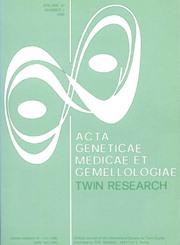Article contents
Risk Factors for Cognitive Aging in Adult Twins
Published online by Cambridge University Press: 01 August 2014
Abstract
Monozygotic (MZ) and dizygotic (DZ) twins in later adulthood were studied in order to examine genetic and environmental contributions to the decline of cognitive performance. In this study, 118 twin pairs took a comprehensive medical examination at a university hospital. Cognitive function was measured by the Wechsler Adult Intelligence Scale (WAIS). The intraclass correlation coefficients on Digit Span (D) and Digit Symbol (DS) subtests of the WAIS did not show any significant difference between MZ and DZ twins although Block Design (BD) showed a significant difference. The values of the intraclass correlation coefficients were mostly around 0.5 and showed significant within-pair similarity of test scores. The mean score of D, DS and BD declined with advancing age. The intraclass correlation coefficients for D, DS and BD were around 0.2 in the MZ twins reared apart, and around 0.6 in the MZ twins reared together. These results indicated a significant environmental influence on cognitive aging in later adulthood.
- Type
- Research Article
- Information
- Acta geneticae medicae et gemellologiae: twin research , Volume 41 , Issue 2-3 , July 1992 , pp. 187 - 195
- Copyright
- Copyright © The International Society for Twin Studies 1992
References
REFERENCES
- 5
- Cited by


